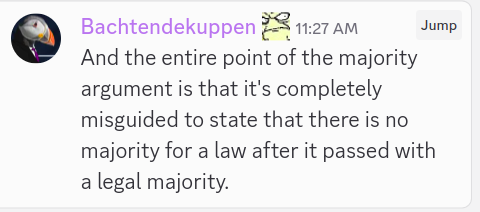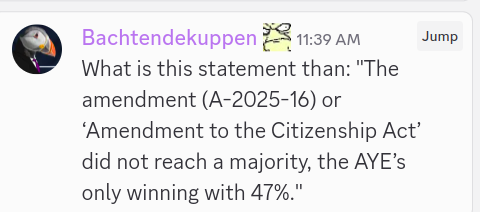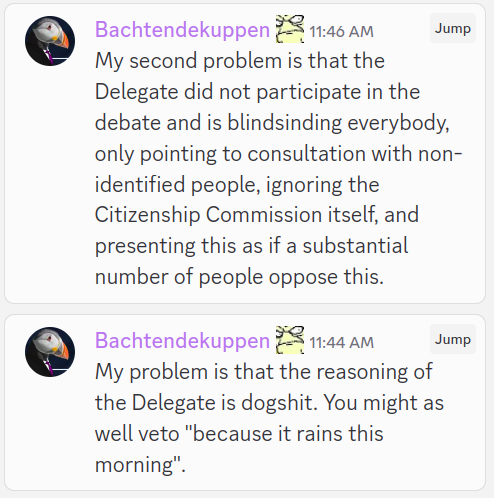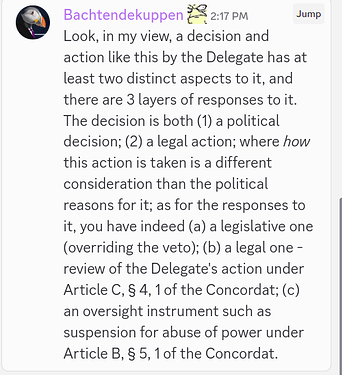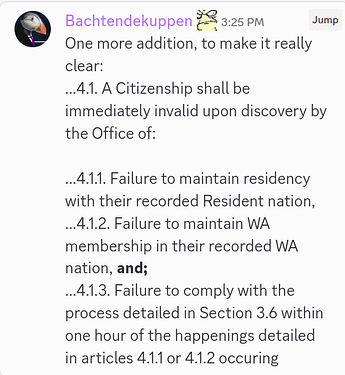A lot to comment on here, and a lot of my comments have been posted to Discord. I’ll try to recompile them here for the record.
As to the veto and it’s justification:
(see here)
(see here)
(see here)
As to the legal nature of a veto and its remedies:
(see here)
Now, going over that veto, I’ll clarify a few of my positions, because I’d prefer this to be on the record.
This is a decision I’ve made as Delegate, with the advice and feedback of members of the region. To help you understand why I’ve made this decision, I’ve laid out my rationale below.
Good. We have a decision by the Delegate, which is an action reviewable under Article C, Section 4, 1 of the Concordat ("The Conclave may rule on the actions of the Delegate … "). The Concordat doesn’t require an explanation, but here we have a rationale that is explicitly added to the decision (see here).
Just to get that out of the way.
- The amendment (A-2025-16) or ‘Amendment to the Citizenship Act’ met a legal majority by one vote. I was wrong to state that it didn’t, and this was due to my lack of understanding of the voting process. I do believe that because of this slim majority
This read differently before, and has been changed. I can’t find the previous version. I greatly object to changing this without including the previous version, as it hides from further debate and destroys part of our record.
I refer though to the Discord-post I added above.
What the Delegate does here is not only vetoing, and vetoing on any consideration whatsoever, what the Delegate does is vetoing because a certain majority, as determined by the Delegate, was not achieved. That is not in any way, shape or form the prerogative of the Delegate to determine, and runs counter to the Concordat.
The instantaneous removal of citizenship is a great inconvenience laid on the residents of The East Pacific. The justification is that it takes work off the shoulders of the citizenship office; however, this only places a great burden on the residents of TEP, many of whom will be unjustly and immediately punished for actions they may not have yet even realised they had taken.
This actually fails to state why this would be an inconvience.
Importantly, this amendment is, by definition, incredibly hostile to foreign military cosmos of TEP, that being members who participate in more than one region and in a military different from TEPs. It essentially forces these soldiers with a mobile WA membership to either permanently move their WA to TEP, which many will undoubtedly be uncomfortable with, or enlist in the EPSA, lest they lose the various benefits their citizenship provides them. Although they can inform the office of their moving WA nation to keep their citizenship, this is a tedious process, especially for people who may be moving their WA often and only for a few hours at a time.
This claims a hostility exists because it would be either permanent WA in TEP or joining EPSA (the horror?). But next states a third alternative anyway, being informing the Citizenship Office. Why sending a telegram would be “tedious” is not explained.
While the amendment has good intentions, being the strengthening of our regional security, this amendment simply does not accomplish enough to warrant the alienating of a large portion of our region’s active community. This amendment will not prevent foreign enemies from infiltrating our region, if they are so determined, and unjustly punish those in our region who simply want to experience what TEP has to offer.
The first part is not explained, unless not preventing foreign enemies from infiltrating is why it’s not enough. But that’s not the goal of this legislation. Never was. Someone who would have read the debate on it, would know that. So this is a strawmans argument if I ever saw one. What part of this is “punishing” isn’t explained either.
And that’s it. That’s all we got.
Not only is the Delegate unilaterally employing and enforcing majority requirements against the Concordat, the rest of the decision is either unexplained, a fundamental misunderstanding of the amendment, self-contradictory or just plainly a strawmans argument.
Bravo.
Now, in a side note to this, I had a very productive discussion with @EvanRikuta on how Section 4 of the amended law would apply, and how it fits with Section 3.6.
Basically, anyone complying with the notification requirement under 3.6, can not be removed in an audit under Section 4.
@EvanRikuta and I came to the following amendment to clarify this:
(see here)
I see AMOM has found a compromise with our Delegate, and is amending the law in another direction. That’s of course his prerogative, and shows a lot more grace than I could give this … decision.
